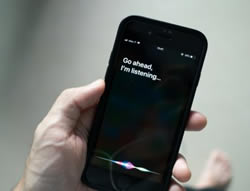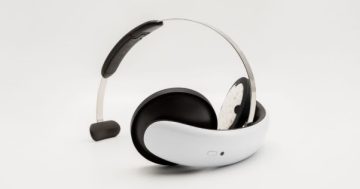Dr Johanne Trippas* says conversational systems may play a key role in future mental healthcare and have the potential to help cut down global e-waste – but there are caveats.
 When it comes to our mental health, human conversation is the most natural form of communication.
When it comes to our mental health, human conversation is the most natural form of communication.
And when it comes to living in the 21st century, technology plays a pivotal part in that communication.
But most of us are still interacting with our technology through a keyboard and mouse, and most of us rely on hardware – whether it’s our phones or our laptops – that usually only last for three to five years.
So, what if we could use a more natural form of interaction to communicate with computers that’s also healthier and creates less electronic waste?
The conversational revolution
Conversational systems are not new.
These systems are computer programs intended to interact with humans, often consisting of many different technological components, including natural language processing and machine learning.
You’ve probably already used them. Siri has become the easiest way for many people to search for an answer to a niggling question.
And other people almost see Alexa as part of the family.
Conversational systems enable people to access information through natural language.
This means that people who have a visual impairment, dyslexia or limited literacy skills can access information more easily without having to use a screen.
The renewed research in conversational systems, coupled with the emergence of smart devices, has increased how this technology is being used.
Not only can these systems perform simple commands – like turning on your lights or monitoring your solar system – but they are also being used in healthcare.
For example, they can be used to identify cardiac arrests over the phone.
Conversational systems in health
Although many people may think of conversational systems as new, they’ve actually been around for a while.
And they’ve also been part of the healthcare domain for some time.
One of the first working conversational systems was ELIZA, created by MIT professor Joseph Weizenbaum in the mid-1960s.
ELIZA could reply to user input that imitated the interactions between a patient and therapist.
These days, our more sophisticated systems can support people to choose a healthier lifestyle, promote vaccinations or help medical professionals.
And it’s in the healthcare sector that conversational systems could really come into their own – particularly now, as the global COVID-19 pandemic has highlighted how our health demands are outstripping supply.
Globally, the pandemic has disrupted healthcare chains that try to provide health services and lifesaving interventions.
It has highlighted the shortage of medical staff worldwide; more than 40 per cent of all countries in the world have less than ten medical doctors available per 10,000 people.
And in mental healthcare, it’s underscored that there are not enough mental health professionals to meet demand, especially in remote or developing areas.
Engineering health(y) e-coaches
Conversational systems have potential in mental health.
Take the Woebot. This system (or agent) promises a “simulated supportive conversation that encourages authentic disclosure and makes therapy radically accessible”. It aims to help manage mental health through conversations with mood tracking or games.
These agents can not only discuss people’s mental status but, in terms of training medical professions, they can also mimic a patient’s real-life conversation.
And then there’s e-coaching.
Conversational e-coaches aim to motivate patients toward healthier behaviours. NESTORE, for example, is a “personalised coaching system to support healthy ageing” which will suggest activities and services tailored to “your personality, your environment and your health status”.
If we consider the potential impact of conversational systems on mental healthcare, it’s unlikely these systems will replace medical doctors.
And all conversational systems must have a fallback when it comes to handling emergencies.
Human support must be a part of any strategy dealing with complex situations, such as when there is a high risk of self-harm.
But conversational systems may change how doctors analyse patient information or construct a personalised treatment plan.
And future doctors may find that these systems act as a decision support tool.
However, before conversational systems can play a greater role in health, we need to better understand the long-term implications of the technology, investigate how much empathy these systems should show and, even understand the impact of things like emojis on health conversations.
Data privacy is also a crucial concern for conversational health systems.
All conversational data needs to be de-identified at every point that the information passes through – including machine learning, but also GPS locations, Bluetooth signals or WiFi connections.
Importantly, some conversations may be spoken rather than typed and recorded for transcription, which means there’s a risk that a person may be identified.
So, a clear understanding of data privacy is vital.
Battling e-waste with conversational systems
During COVID-19, more of us have become aware of the health crises faced by many across the world and the issue of equitable access to health services.
But at the same time, the pandemic has raised public awareness about the importance of nature and the impacts of climate change.
In fact, a recent global survey found that the pandemic has heightened environmental awareness, with 70 per cent of people saying they are now more aware that human activity threatens the climate.
And electronic waste – or e-waste – is a big contributor to the problem. In 2019 alone, there were 53 million metric tons of electronic waste.
Conversational systems have a big potential to reduce our e-waste.
Instead of using a keyboard, mouse, trackpad, or an ever-expanding number of cables to communicate with our computers, conversational e-coaches can be embedded in existing hardware – like our phones.
This simple step can reduce the need for extra electronic equipment or outdated hardware.
So, before you update your latest electronic device, have a ‘conversation’ with yourself about whether it’s going to make you happier.
Being mindful about our mental health is essential, and there is an increasing number of conversational systems becoming available that will potentially offer help to those who need it.
But being aware of the environmental impacts of your technology could also help the planet.
*Dr Johanne Trippas is a Doreen Thomas Postdoctoral Fellow, School of Computing and Information Systems, Faculty of Engineering and Information Technology, University of Melbourne.
This article first appeared at pursuit.unimelb.edu.au.











